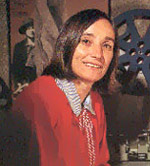
-
 Busi Cortés
Busi Cortés
(México, 1950)
Al finalizar la carrera de Comunicación en la UIA, orienta su interés hacia la realización cinematográfica e ingresa en 1977 al Centro de Capacitación Cinematográfica (CCC), donde dirige los cortometrajes Las Buenromero (1978), Un frágil retorno (1979) y el mediometraje Hotel Villa Goerne (1981); en el mismo año asiste a Alfredo Joskowicz y a Felipe Cazals en la serie Historia de la educación. Su corto El lugar del corazón (1983), producido por la UIA y el CUEC, recibe mención honorífica en el Festival de Televisión Universitaria de Lima, Perú, en 1983. Participa en la realización del proyecto televisivo De la vida de las mujeres, producido por la UTEC, como guionista y directora de los cortos: Las rumberitas, Alfonsina, Amor de raio, La mujer de Nicolás, Fuera máscara y La niña robada, todos entre 1984 y 1985. Su primer largometraje, El secreto de Romelia (1988), es una adaptación realizada por ella del cuento de Rosario Castellanos El viudo Román, cinta que recibe el Ariel y la Diosa de Plata por mejor Ópera Prima, el premio Pitirre en el Festival de San Juan y el premio ACE de Nueva York, todos en 1989. Coescribe, con Carmen Cortés y Alicia Molina, el guión de su segunda película, Serpientes y Escaleras (1991). El mediometraje Déjalo ser (1993), de la serie documental 18 lustros de la vida en México, producido por la Filmoteca de la UNAM, es nominado al Ariel en 1994. Escribe algunos guiones de la serie Encuentros y Desencuentros, financiados por el CCC y el CONACULTA. Desde 1994 se dedica al documental.
Ha ejercido la docencia en el CCC, el CUT de la UNAM, la UIA y la Universidad de Colima. En 1998 coordina Pasando el siglo en el cine, serie realizada por alumnos de diversas universidades, y produce en TV, para la SEP, los documentales que integran la serie Retos y Respuestas, basados en la integración de personas discapacitadas a la sociedad. A partir de 1998 forma parte del profesorado que imparte los diplomados de la Cineteca Nacional en el D.F. y en provincia.
En 2001 la Dirección General de Actividades Cinematográficas de la UNAM le otorgó el Premio José Rovirosa al mejor documental por el filme Paco Chávez, que codirigió con el realizador Francisco Chávez. En el 2005 filma Hijas de su madre: Las Buenrostro.
Busi Cortés (1950-) finished her university course on Communication at the UIA; then she looked forward to filmmaking and registered in the Film Training Centre (Centro de Capacitación Cinematográfica, CCC) in 1977, where she directed the short films Las Buenromero (1978), Un frágil retorno (1979) and the medium length film Hotel Villa Goerne (1981). The same year, she worked as assistant to Alfredo Joskowicz and Felipe Cazals in the series Historia de la educación. Her short film El lugar del corazón (1983), produced by UIA and the CUEC, won an honorable mention at the University Television Festival in Lima, Peru, in 1983. She participated in the television project De la vida de las mujeres, produced by UTEC, as scriptwriter and director of the short films: Las rumberitas, Alfonsina, Amor de raio, La mujer de Nicolás, Fuera máscara and La niña robada, all of them made between 1984 and 1985. Her first feature film, El secreto de Romelia (1988), is her adaptation of the short story by Rosario Catellanos El viudo Román; this film won the Ariel and Diosa de Plata Prizes to Best First Work, the Piterre Prize at the San Juan Festival, the ACE Prize of New York, all of them in 1989. She wrote, together with Carmen Cortés and Alicia Molina, the screenplay of her second film Serpientes y Escaleras (1991). The medium length film Déjalo ser (1993), of the documentary series 18 lustros de la vida en México, produced by the Film Library of the UNAM, was nominated to the Ariel in 1994. She wrote some scripts for the series Encuentros y desencuentros, financed by the CCC and CONACULTA. Since 1994, she devotes herself to making documentaries.
She has been a professor at the CCC, CUT of UNAM, UIA and the University of Colima. In 1998, she coordinated Pasando el siglo en el cine, a series made by students of several universities, and produced in television for the SEP the documentaries that are part of the series Retos y respuestas, based on the integration to society of handicapped people. From 1998 on, she became part of the teaching staff of the diploma courses at the National Film Library in the Federal District and in provincial sites.In 2001 the General Direction of Film Activities of the UNAM awarded her with the prize José Rovirosa for best documentary for the film Paco Chávez, co-directed with filmmaker Francisco Chávez. In 2005, she directed Hijas de su madre: Las Buenrostro.
References in the multimedia
El secreto de Romelia, 1989, Direction
Serpientes y escaleras, 1992, Direction

Referencias en el Portal:
El secreto de Romelia, 1989, Dirección
Serpientes y escaleras, 1992, Dirección
Referencias en la Biblioteca Digital:
Busi Cortés: Hay que ganarle terreno al cine norteamericano (recorte)
Con calidad, sólo parte de lo exhibido (recorte)
El melodrama, la comedia y un documental (recorte)
Serpientes y escaleras (recorte)

